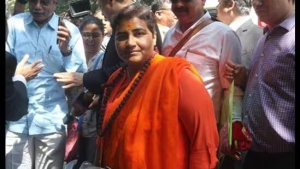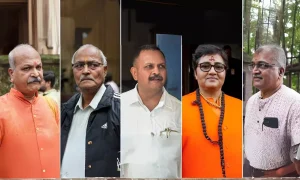Maharashtra – The Malegaon blast HC notice has sparked renewed debate after the Bombay High Court issued directives to key figures, including Pragya Singh Thakur, Lt Col Prasad Purohit, and the National Investigation Agency (NIA). The notice was issued in response to appeals filed by families of victims of the 2008 Malegaon bomb blast. These families are challenging the acquittal of seven accused who were cleared by a special NIA court in July 2024.
Background of the Malegaon Blast Case

The Malegaon blast HC notice relates to the incident of September 29, 2008, when a bomb exploded in Malegaon, killing six people and injuring several others. The tragic incident triggered one of the most controversial terror investigations in India. Initially, the Maharashtra Anti-Terrorism Squad (ATS) arrested the accused, who were later acquitted by the special NIA court citing lack of concrete evidence.
Families of Victims File Appeal
Relatives of the deceased victims sought justice through an appeal that led to the Malegaon blast HC notice. The appellants include parents, siblings, and relatives of those killed. They argued that the acquittal by the special NIA court was unjust and riddled with investigative lapses. Their legal representatives maintained that the trial court had failed in its duty by not ensuring a thorough examination of all evidence.
Bench Observations and Directions
The bench, headed by Chief Justice Shree Chandrashekhar and Justice Gautam A. Ankhad, ordered the issuance of the Malegaon blast HC notice to the acquitted individuals, the NIA, and others. The court directed appellants’ counsel to ensure proper service of notices and scheduled the matter for further hearing six weeks later.
Acquittal by the Special NIA Court

The July 2024 acquittal prompted widespread controversy. The trial court had ruled that suspicion alone could not substitute for proof. In its verdict, the special NIA court observed that there was no “reliable and cogent evidence” linking the accused to the Malegaon blast. The Malegaon blast HC notice now seeks to revisit these conclusions.
Petitioners’ Key Arguments
The appellants argued that conspiracies of this nature are rarely proven through direct evidence, as they are carried out in secrecy. They claimed that the trial court acted as a “post office,” passively accepting lapses in the prosecution’s case. According to the families, the court should have stepped in by summoning additional witnesses or posing necessary questions. Their demand for the Malegaon blast HC notice stems from the belief that the acquittal benefited from prosecutorial weaknesses.
Also Read: Bombay High Court Questions Shinde’s Shocking Authority Over Navi Mumbai Demolitions
Allegations Against NIA
A central issue in the appeal is the conduct of the NIA. Petitioners alleged that the agency “failed miserably” in protecting witnesses and allowed them to turn hostile without consequence. They further contended that crucial documents—13 in total—went missing during the trial, and neither the prosecution nor the court ordered an inquiry into the disappearance. This failure is one of the primary reasons why the Malegaon blast HC notice has been issued.
Political Interference and Dilution of Charges
The appellants also alleged political interference in the case, accusing the NIA of watering down charges after taking over from the ATS. They noted that the ATS had initially exposed the conspiracy in 2008 by arresting the accused. After those arrests, the appellants claimed, no further bomb attacks took place in minority-dominated regions. They argue that this underscores the gravity of the ATS findings, which were disregarded by the NIA and later overlooked by the special court. The Malegaon blast HC notice seeks to reopen these questions.
Call for Justice and Accountability


The petitioners described the trial court’s ruling as “bad in law” and urged the high court to quash the acquittal. They emphasized that lapses in investigation cannot become grounds for acquittal in cases of terrorism. They also criticized the failure to file perjury cases against hostile witnesses, an omission that weakened the prosecution’s case. For them, the Malegaon blast HC notice represents hope for accountability.
The Road Ahead
With the Malegaon blast HC notice now issued, the Bombay High Court will review the evidence and arguments afresh. The families of victims view this as a critical moment in their long pursuit of justice. While the legal battle continues, the case highlights the challenges of prosecuting terror conspiracies and the importance of ensuring robust investigations.
The upcoming hearing will determine whether the acquittal stands or whether the matter is reopened for deeper scrutiny. For the families of the six victims, the Malegaon blast HC notice is not just a legal step—it is a symbol of their demand for justice that has been long denied.

